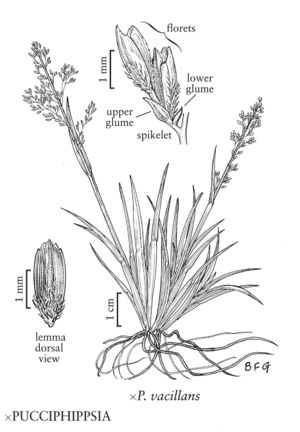×pucciphippsia vacillans
Culms 7-15(23) cm, erect, glabrous. Sheaths closed for 1/3-2/3 their length; ligules 0.5-2.7 mm, apices entire, truncate, rounded or acuminate; blades 1.5-6(8) cm long, 1.5-3 mm wide. Panicles 1.5-4.5 cm long, 1-2 cm wide; branches smooth; primary branches 1.3-14 mm, erect to ascending. Spikelets 2-3.5 mm, pedicellate; rachillas glabrous or pubescent, internodes 0.2-2.2 mm, prolonged beyond the uppermost floret. Glumes glabrous; lower glumes 0.4-0.8 mm, (0)1-veined, occasionally absent; upper glumes 0.5-1.4 mm, 1-3-veined, obtuse; lemmas i.8-2.6 mm, (1)3-veined, pilose basally, particularly on the veins, apices entire or erose, truncate to acute; paleas 1.5-2.5 mm; anthers 1-3, 0.5-1 mm. 2n = 21.
Discussion
×Pucciphippsia vacillans is a sterile hybrid between Puccinellia vahliana and Phippsia algida. It grows in damp, open habitats such as wet meadows, wet tundra, pond margins, and imperfectly drained areas in silt, till, and moss. It is currently known in North America from Axel Hedberg, Bathurst, Cornwallis, Ellesmere, Devon, and Baffin islands in arctic Nunavut, and from Midgaardsormen, Greenland. Outside North America, it is found on Svalbard and Novaya Zemlya islands, where both parents are also present.
Selected References
None.
